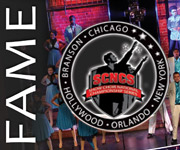
With the choir rehearsing just outside his office and Jordan having become friends with the choir’s director, Roberta Vest, he felt comfortable making suggestions from time to time. “It was the first show choir I had ever seen, but somehow it made sense to me,” he says. “Toward the end of that year, my suggestions on the staging and choreography had become more prevalent, and I had traveled with the group to their very first competition (they came in 4th), so I had a better understanding of the animal.”
That’s when Vest offered him a challenge: If you’re so smart, why don’t you choreograph a song? “Being young and up for a challenge, I thought, how hard can it be? I stayed up late for a couple of night working to get it done, and maybe to everyone’s surprise, it went pretty well. By the next year I was doing all their choreography (they won the competition that year) and was choreographing the high school musical.”
It was an unlikely—or at least unplanned—turn of events for Jordan, whose college career at Millikin University was focused on saxophone, though he also studied flute, clarinet, and voice. He played in the Millikin Jazz Lab Band, the wind ensemble, concert and marching bands, orchestra, and other smaller instrumental and choral groups. On top of all that, “I found time to be in one musical, ‘Promises, Promises,’ which is where it was discovered that I could dance,” Jordan remembers. “Who knew? I was also the lead singer for a cover band. I’m assuming I also went to classes (ha).”
Used to crazy schedules, Jordan spent his four years at Mt. Zion directing the band and choreographing for the show choir while also accepting requests for help from community theaters and other groups. He watched every tape of every musical production he could get his hands on to keep learning.
At the end of those four years, he left his position at Mt. Zion and became a full-time freelance choreographer and show director. Six Flags St. Louis hired him to direct and choreograph shows. Six Flags Great America hired him, too, as did Silver Dollar City and other venues in Branson, Missouri.
His horizons were quickly expanding, but he hadn’t forgotten the thrill of working with students—seeing them discover a passion for the stage and grow into seasoned, talented performers. So in 1978, when Sue Moninger, a fellow alum from Milliken, took him along to a workshop for choral directors, the two made a proposal to Jim Kimmel, the choral editor for music-publishing company Jenson Publications: what about a summer program for students in show choir to come together and learn from award-winning choreographers and choral directors?
“He loved the idea,” Jordan says. “The next thing we knew we were organizing a camp for the next summer.” They brought in well-known composers like Kirby Shaw, Roger Emerson, and Mac Huff. They reserved space at their alma mater, Millikin University. They planned workshops for participants to study even most nuanced aspects of choreography, vocals, and production. They advertised like crazy.
Still, a week before the deadline for registration, the dream of SCA almost died as quickly as it had begun. “We didn’t think we had enough participants to pull it off, so we were ready to cancel,” Jordan says. “Then on the deadline day, about 150 more people signed up.” That brought the total for that first year to 260—a combination of students as well as teachers looking for professional development.
“It went great. We learned a lot that first year. People had a tremendous time, and it just kept going.” Around the fifth season, SCA added a second camp at Heidelberg University in Ohio. They have also hosted camps in Texas, Indiana, and for 10 years at Walt Disney World Resort, where SCA was the first outside group allowed to perform on the Castle Stage. As SCA has grown, it has hosted upwards of 600 to 700 kids at each camp and 100 to 120 teachers and choir directors.
Jordan credits the support of Kimmel and the many others who’ve signed on since. “We have been lucky to have a tremendous support team,” he says. “My wife, Kari, maintains the year-round operation of the camp and wears many hats. Our vocal and choreography clinicians are the best in the country and create the incredible shows the campers come to learn. Our invaluable and trusted executive staff manage the many aspects of the camp week required when you have such a large camp of participants. Our SCA counselors are almost all past campers and do a remarkable job. It really has become a family.”
Jordan says the students range from kids new to the show choir experience to those who have participated in the camp before and return to continue honing their skills. “It’s a little like a high-school athlete,” he says. “Even though a player is getting great training during the school year, every summer most are also going to a training camp or two just to get that extra experience. For kids in show choir, it’s the same. They come to SCA and have the chance to work with the different professionals and gain insights and experience as performers.
He continues: “If they are new to show choir, the opportunity is there to learn the basics and be prepared for the upcoming season. If they are more advanced, they may have the opportunity to be in the dance ensemble that continues to push them as dancers or the experience of a special vocal ensemble or the talent showcase. They learn a full show choir show in one week, take workshops, enjoy nightly performances including a Broadway star, and then go back home with a new confidence that will be reflected in their performance with their own show choir.”
Including training for show choir directors and teachers was always part of the plan, he adds. “Our teacher camp is a seminar for choral directors and choreographers offering a wide range of workshops, reading sessions, and performance opportunities. These teachers put on their own show at camp like the kids do. It’s pretty impressive what they do and a lot of fun for them. It’s their opportunity to hang out with friends old and new who get what they do and to get pumped up for the upcoming year.”
Jordan says camaraderie has always been a defining aspect of the SCA experience. “They love getting a chance to do this with new people from all over the country,” he says. “It sounds cliché, but they make lifelong friends with people they never would have met.”
Outside of SCA, Jordan continues working to learn and grow as a choreographer and show designer. He has received many awards for his work in outstanding choreography in show choir, is an internationally sought after consultant and clinician, and has guest conducted at international festivals in the Netherlands, Spain, Germany and Estonia.
Jordan also took a moment to share what he personally aspires to when choreographing a new show. “I try to make certain there’s something memorable in every song I do,” he says, “something that’s going to stick in people’s minds after they’ve seen it. It’s not just dance steps but something that has a purpose and a flow. My other goal is always to make sure I’m giving these young performers material that is fun to perform. They work so hard, I want the final product to be something that makes sense to them, something they are proud of and something that shows off their personality. When it’s fun and makes sense, it’s easy to be genuine on stage, and then everyone has a great time.”
More information about SCA and how to register can be found at showchoircamps.com.











